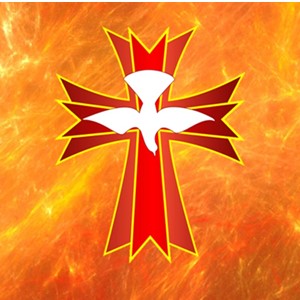 I’m a huge fan of the Holy Spirit part of the trinity. Something fiery which can immediately make you fluent in another language? Yes please, I’ll take the fire that lets you speak all the languages with all the people, thank you. Although, for most of my life, it was only really the part about languages and fire I was fascinated by, I never thought much about the Holy Spirit itself until I spent a week at Taizé back in 2014.
I’m a huge fan of the Holy Spirit part of the trinity. Something fiery which can immediately make you fluent in another language? Yes please, I’ll take the fire that lets you speak all the languages with all the people, thank you. Although, for most of my life, it was only really the part about languages and fire I was fascinated by, I never thought much about the Holy Spirit itself until I spent a week at Taizé back in 2014.
In my bible study group at Taizé, one question we discussed was to whom we addressed ourselves when we prayed. God, God, Jesus, God, Jesus, Jesus, yup, yeah, then suddenly my new friends from Madagascar, the first friends I made upon arrival, responded the Holy Spirit. Wait, what did you say my friends?? They were the only ones with that answer in my group. Seeing the collective confusion of our group, they explained that they started off their prayers by asking the Holy Spirit to come and fill them so nothing else could disturb them. Ok, yeah, that makes sense, that does sound like a good way to get into the right prayer mindset. However, the answer really took me aback, because I never really spent much time contemplating that part of the trinity and I’d certainly never considered addressing my prayer to the Holy Spirit. Of course, Taizé’s symbol represents the Holy Spirit, the favorite color of the founder, Brother Roger, was orange because of its connection to the Holy Spirit, and Taizé has some really great Holy Spirit Pentecost-appropriate music, like Veni Sancte Spiritus. Needless to say, I was going to be thinking a lot about the Holy Spirit at Taizé.
The Holy Spirit is described in many ways; as giving gifts (who doesn’t like gifts?), being an advocate (something which often comes up at my SCC), permitting transmission of knowledge, a creative force, a loving force, a unifying force, and having the power to remove sins. In the first reading, we see the Holy Spirit permitting the transmission of knowledge through the ability to speak multiple languages, which also has a unifying effect on the diverse groups present. The second reading mentions the gifts of the Holy Spirit (wisdom, understanding, counsel, fortitude, knowledge, piety, and fear of the Lord), which help unite us to the body of Christ. In the gospel, Jesus refers to the Spirit’s role in the sacrament of reconciliation.
Taizé is the place I most strongly felt the Holy Spirit. The fire lit within by the love radiating from the community was so inspiring. On a rare occasion, especially when I’m having trouble praying in a concrete way, sometimes I too address myself to the Holy Spirit. My eyes still light up when the readings about the Holy Spirit’s fire allows people to speak languages come up, but I think that my time at Taizé spurred a slightly deeper understanding. So, I’m pretty excited it’s Pentecost.



